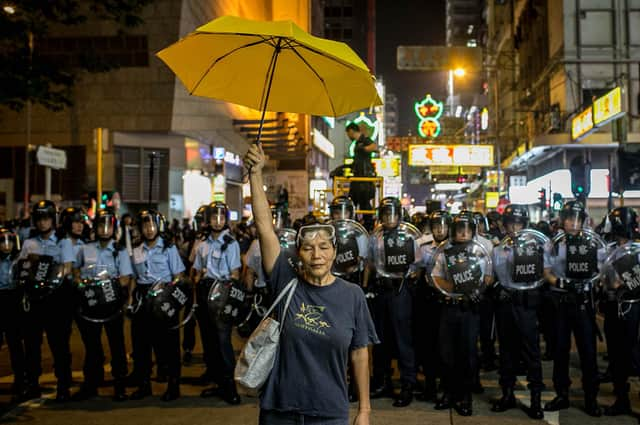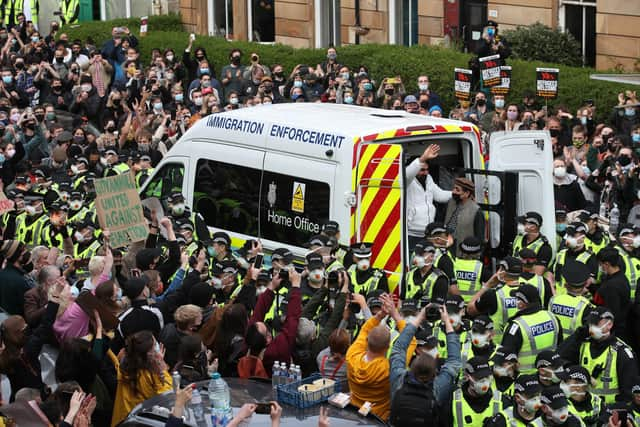True values are not Scottish or British, they are universal and embraced by democrats all over the world – Joyce McMillan


It has been one of the features of this pandemic year, following the death of George Floyd in Minneapolis last May, that all across the western world, traditional attitudes to race and to black lives have been re-examined as never before.
And, on long lockdown walks around Edinburgh, I have found my view of the city’s elegant terraces and gorgeous grey sandstone gradually beginning to shift, as I come to understand how profoundly this architectural opulence is connected to an 18th and early 19th-century British economy heavily linked to the slave trade, and to Scotland’s enthusiastic and disproportionate involvement in a British imperial system which, from the Caribbean to Sri Lanka, could hardly have functioned without the forced labour of human beings bought, sold and transported like animals.
Advertisement
Hide AdAdvertisement
Hide AdIn writing even this much, though, I know that I will attract criticism from at least two quarters: from those who see the British Empire as a fundamentally benign force, and struggle to recognise any alternative view, and from those who – while happy to blame the British state for all manner of ills – prefer to see Scotland as innocent in this matter, a nation more colonised than colonising.
At moments of strong nationalistic feeling, narratives of innocence and victimhood often take on a huge political importance in fuelling the desire for change; and just as some Brexit warriors see Britain as a benign and decent country, bravely struggling to escape the grip of an oppressive European Union, so some Scots see Scotland as a blameless and virtuous nation, caught – but not complicit – in the toils of a Union with a bloody history, and a fairly contemptible present.
If there is one thing we should surely have learned from the events of the past two weeks, though – and particularly from the two faces of Glasgow so vividly demonstrated in Kenmure Street last Thursday, when thousands of citizens turned out to protect their neighbours from a dawn raid by the UK immigration service, and then in George Square last Saturday, when a section of Rangers fans rioted, urinated, and generally wrecked the joint in celebration of their team’s Scottish Premiership victory – it is that these kinds of claims to special virtue ill become any country, and tend to be accompanied by dangerous levels of denial about domestic evils that need to be confronted, rather than ignored.
There is, of course, a set of enlightened and humane values suggesting how human beings should live together in justice and peace – values which were embraced with particular passion after the Second World War.


They involve liberty, fraternity, equality before the law, and a profound culture of mutual respect, capable of dealing with difference; and it is true that Scottish thinkers of the Enlightenment, and later British institutions partly shaped by those influences, have sometimes played a key role in articulating and developing those ideas.
Politicians never sound more foolish, though, than when they try to slap a national flag on what are clearly universal human values, embraced by democrats and humanitarians from Hong Kong to Hawaii.
Michael Gove, a few years ago, made a memorably ill-judged attempt to claim “fairness” as a uniquely British value. Americans are always laying special claim to the values of freedom and equality, as if no-one had ever thought of them until George Washington came along.
And I’m afraid Scots sound equally daft, when they claim a unique relationship with the idea that “we’re all Jock Tamson’s bairns”, which can be found expressed in national cultures across the world, particularly when they are in a phase of struggle for social justice or self-determination.
Advertisement
Hide AdAdvertisement
Hide AdWhat we learn from these recent events, in other words, is that in every country there are those who will stand up to defend those basic human rights and freedoms against governments and others who seek to abuse them; and there are others who, for reasons of their own, increasingly explicitly reject those values, and proudly declare themselves racists and sectarians, profound believers in white and male supremacy, and in the idea that might is right.
Increasingly, these far-right groups are well networked, linked to supporters of right-wing forces and politicians ranging from Donald Trump to the present government of Israel; and it was obvious from some of the slogans and chants on view last Saturday that Scotland has its share of people attracted to those groups.
All of this, of course, is not to say that all countries are the same. At the moment, Scotland clearly has a different majority view on its preferred future from England. We demonstrate that difference at the ballot box, and we have a right to express it by becoming an independent nation if we wish.
If we make that journey, though, it will not be because we wrap ourselves in a childish illusion of innocence, and blunder towards the future armed with the false hope that an independent Scotland will automatically and magically be a better place.
It will because we have gained enough confidence to see our history steadily and whole, and to confront our present problems with honesty, courage and compassion, while resolving, nonetheless, that now is the time to take responsibility for our own story, to make our own reparations, and to try to carve our own path, into a more just and harmonious future.
A message from the Editor:
Thank you for reading this article. We're more reliant on your support than ever as the shift in consumer habits brought about by coronavirus impacts our advertisers.
If you haven't already, please consider supporting our trusted, fact-checked journalism by taking out a digital subscription.
Comments
Want to join the conversation? Please or to comment on this article.
